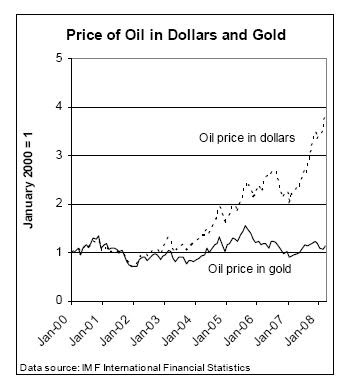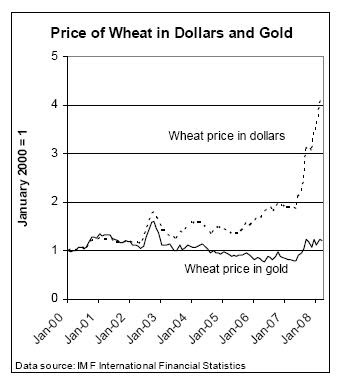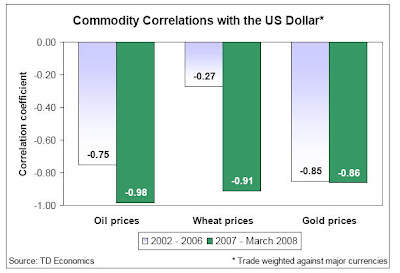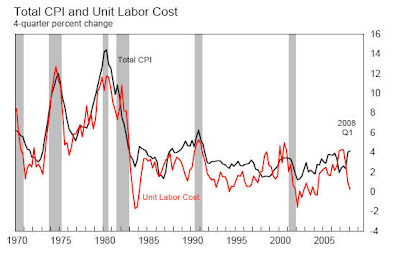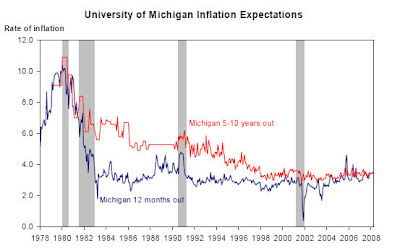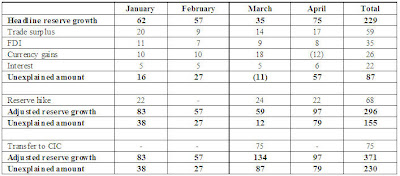Bernanke links falling dollar to rising inflation expectations
Bernanke acknowledged dollar's slide against other currencies has led to an "unwelcome" rise in U.S. inflation and may be a factor in inflation expectations. Full speech here.
Good thing about high oil price
General Motors CEO Rick Wagoner said the company plans to cease production at
four North American plants that build pickups, SUVs and medium-duty trucks amid
the sharp rise in oil prices and the "significantly more difficult" auto market.
The company plans to fund its Chevy Volt electric vehicle for commercial
development and hold a strategic review of its Hummer brand. Auto makers are
scheduled to post monthly sales results later today.
Robert Barro interview
Robert Barro's bloomberg interview (audio mp3) on monetary policy, economic growth, China's development experience, economics of religion, etc.
Currency-led commodities bubble
Benn Steil, Director of International Economics at Council of Foreign Relations, thinks the commodities bubble was caused by sharp fall of US dollar and investors’ inflation concern. The commodities bubble is essentially a “currency bubble”, so he called.
Expressed in gold, prices of oil and wheat haven’t changed much.
And the correlations between commodities and US dollar increased to over -0.9 recently.
I am sympathetic to Steil’s view and I see some parallel between the housing bubble and current commodities bubble.
In 2001, when economy was in recession and Greenspan Co. cut rates 11 times to 1%. Investors, lack of investment opportunities after dot.com bubble, all flocked to housing sector. Actually, housing was probably the only bright spot then.
In current cycle, Bernanke co. cut rates in a similar fashion, prolonging dollar’s downturn, and investors again poured their money into the “safe haven” as a hedge both against inflation/US dollar and meager investment opportunities in a time of credit crunch, and twin crisis in both housing and financials.
Yellen speech on economy and inflation
Janet Yellen, President of San Francisco Fed, ruled out stagflation scenario and she forecast “the most likely outcome over the next couple of years is that total and core inflation will moderate from present levels”. But she thinks “The Federal Reserve cannot, however, be complacent about inflation”.
She somewhat shares the worry that “even if the direct influences of commodity prices on inflation eventually dissipate, they could still cause trouble…higher inflation could become built into inflation expectations and become self-perpetuating”. But she thinks so far there is no evidence for such case, especially inflation is very unlikely to pass on to the wage this time, causing a wage-price spiral like the 70s.
The full speech can be read here and her presentation slides here. Below are two nice charts from her presentation.
Rent or buy? you calculate yourself
A nice house rent-versus-buy calculator from NYT, and related article.
Hot money pouring into China
In previous post, I analyzed inflation and hot money inflow in China. Now here is a piece from Michael Pettis. In it, he analayzes the composition of China’s capital inflow in the first four months of 2008.
“If this is true that means that reserves grew in the month of April by $74.5 billion, the biggest one-month reserve jump in China’s history (and probably in the history of the world)…
To get a sense of scale, in 2006 reserves were up $247 billion for the whole year. This, at the time, was a number guaranteed to shock. No central bank in history has seen reserve growth at anywhere near this scale. Nonetheless in 2007, the growth in reported reserves nearly doubled over the previous year — $462 billion – and more than doubled if we backed out a series of transactions that reduced headline reserve growth but had no net impact on the monetization of currency inflows…”


